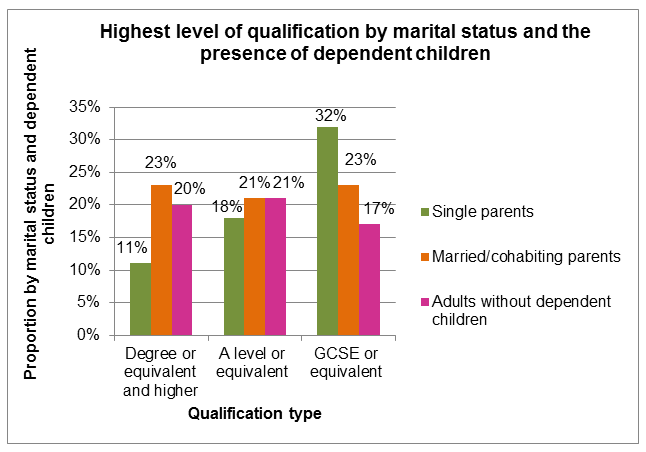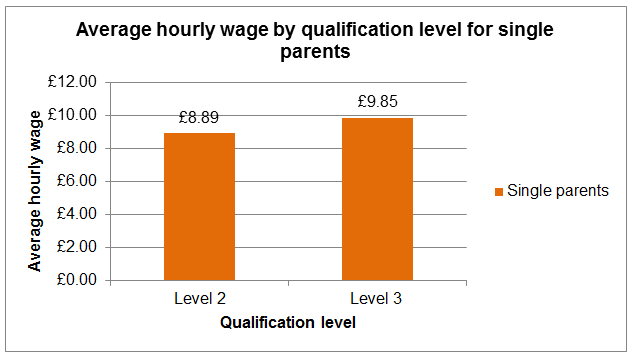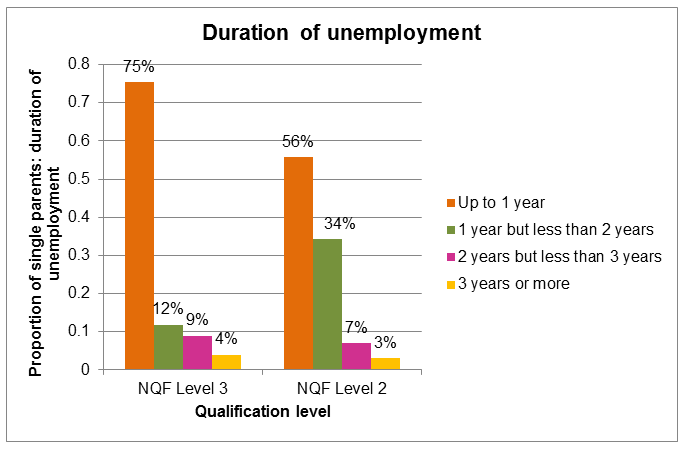 What gains are there to equipping single parents with further qualifications? A new report finds that, since qualification levels have a direct relationship with an individual’s earning prospects, these investments would ultimately pay off with the government gaining from additional revenue from income tax and national insurance contributions, as well as seeing a reduction in benefit payments. Philippa Newis summarises the findings.
What gains are there to equipping single parents with further qualifications? A new report finds that, since qualification levels have a direct relationship with an individual’s earning prospects, these investments would ultimately pay off with the government gaining from additional revenue from income tax and national insurance contributions, as well as seeing a reduction in benefit payments. Philippa Newis summarises the findings.
The single parent employment rate has been steadily increasing over the last two decades; 60 per cent of single parents are now in work. However, the majority of single parents – 68 per cent – enter work in the three lowest paid occupational groups; entrenching their risk of poverty. Low levels of qualifications among single parents can compound this problem by making it harder for them to compete for better paid work and to progress once in a job.
Gingerbread’s new report, Making the Grade, looks at the gains that government and single parents could make from further investment in training. We have found that the government could potentially gain:
- Up to £670 million when supporting unemployed single parents to complete a one year level 3 course and they move into work of 20 hours a week on an average level 3 salary; or
- Up to £350 million when supporting unemployed single parents to complete a two-year level 3 BTEC course and they move into work of 20 hours a week on an average level 3 salary
Single parents are highly motivated to work: they want to earn their own money, be less reliant on benefits and be a good role model for their children. However, the support available to single parents seeking to improve their job prospects does not match their level of aspiration.
Source: ONS (2009) Social Trends 39
Single parents are disproportionately lower qualified; almost a third of single parents have a highest qualification at level 2, compared with just over a fifth of couple parents. Single parents with lower level qualifications struggle to get on in the labour market and are more likely to work short hours or in part-time jobs.
Poverty is a constant feature in the lives of many single parents, and work not always the route out; a third of those who work part-time are living in poverty, as are almost a fifth of those working full-time. Single parents need access to further education that will open the door to employment in higher paid jobs, but are navigating a welfare system that is not currently set up to facilitate career transitions; high childcare costs and a lack of good quality flexible or part-time work can conspire to exclude single parents from jobs that offer greater financial rewards.
Gingerbread commissioned the Centre for Economic and Social Inclusion to undertake a cost benefit analysis using data from the Labour Force Survey and the minimum income calculator produced by Loughborough University. The analysis compares single parents with a level 2 qualification working at 16 or 20 hours a week on an average level 2 wage with single parents who gain a level 3 qualification and subsequently move into employment of 16 or 20 hours a week on an average level 3 salary.
Source: Labour Force Survey 2009-2012, 16 quarters combined
We found that qualification levels have a direct relationship with an individual’s earning prospects. Gaining a level 3 qualification increases the average hourly wage a single parent can achieve by 11 per cent. Intermediate and higher level qualifications are also a gateway to greater wage progression once in employment.
Furthermore, single parents with a level 3 qualification are better able to compete for jobs; staying in paid work for longer periods and less likely to be long term unemployed. 44 per cent of single parents with a level 2 qualification have been out of work for over a year, compared with only 25 per cent of single parents with level 3 qualifications.
Source: Labour Force Survey 2009-2012, 16 quarters combined
The upfront investment to support a single parent to gain a level 3 qualification who subsequently moves into work of 20 hours a week could be recouped within three years. As the earnings of single parents increase, the government benefits from additional revenue from income tax and national insurance contributions, and reduced benefit payments. Taken together, the government could potentially gain up to £670 million over seven years.
Improved qualification levels bring clear benefits for single parents. However, getting more single parents into jobs that can lift them out of poverty requires a fresh welfare-to-work approach from government. The relentless focus on getting single parents into work as quickly as possible is failing those who could otherwise benefit from gaining an additional qualification before securing a job.
A fresh approach means taking a longer term view as to what support single parents need to move into employment that offers a decent wage and career development. Specifically, the government should adopt an “invest to save” model and provide fully-funded opportunities for single parents to gain their first level 3 qualification prior to their return to the labour market. Jobcentre Plus performance measures need to incorporate sustainable job outcomes, rather than focus solely on benefit off-flows, and single parent jobseekers, whether supported by JCP or the Work Programme, need to be able to complete a level 3 course before getting a job.
The “work-first” approach currently advocated by the government may be a short term fix to high levels of unemployment, but responding to the growing challenge of in-work poverty requires an altogether different tack; one that boosts the qualification levels of single parents to ensure they can compete effectively in the labour market, contribute to the wider economy and lift their families out of poverty.
Note: This article gives the views of the author, and not the position of the British Politics and Policy blog, nor of the London School of Economics. Please read our comments policy before posting. Featured image credit: David Marsh
Philippa Newis is Policy Officer at the charity Gingerbread, the national charity for single parent families. Philippa areas of policy work include: employment, skills and training, and back to work support.










